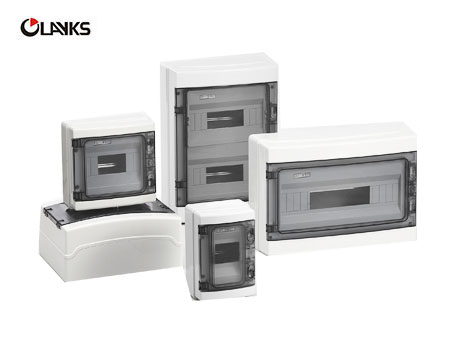

Of course. Here is the content, rewritten and structured for optimal presentation on your webpage, incorporating professional design elements and a clear call-to-action.
In the intricate world of telecommunications, the seamless flow of data relies on a hidden network of critical components. Distribution boxes are the unsung heroes of FTTx (Fiber to the x) networks, acting as the central nervous system where a main feeder cable is branched out to multiple end-users. Choosing the right one is paramount for network reliability and scalability.
This guide provides a detailed overview of the key distribution box types to inform your network design decisions.
Introduction to Distribution Boxes
TSM Distribution Box - The Versatile Workhorse
GHT Distribution Box - The High-Capacity Hub
GHPN Distribution Box - The Flexible Patcher
GHAG Distribution Box - The Outdoor All-Terrain
GHE Distribution Box - The Environmentally Sealed
GMA Junction Box - The Compact Solution
GMT Junction Box - The Durable Terminator
How to Choose the Right Box
Installation & Maintenance
Future Technology
Conclusion
A Distribution Box (DB) is a protective enclosure that serves as the pivotal access point in a fiber optic network. It provides a secure environment for splicing, splitting, distributing, and connecting delicate fiber optic cables. Its primary functions are to:
Protect internal components from environmental hazards like moisture, dust, and physical damage.
Organize fiber splices, splitters, and adapters for clear management.
Distribute a single optical signal to multiple endpoints, enabling efficient network architecture.
The integrity of your entire Optical Distribution Network (ODN) depends on the quality and suitability of these boxes.
The TSM is a fundamental building block in FTTx deployments, known for its reliability and adaptability as a cross-connect point.
✔️ Key Features:
Robust, UV-resistant plastic or metal enclosure.
High port density for splitters and adapters.
Swing-out frame for easy, full access to internal components.
IP65 rating (dust-tight, protected against water jets).
Versatile aerial and wall-mounting options.
🏢 Primary Applications: FTTH neighborhood hubs, local convergence points in building basements, CATV networks.
The GHT is engineered for central distribution points requiring higher fiber counts and superior scalability for future expansion.
✔️ Key Features:
Large capacity for numerous splice trays and splitter modules.
Modular design to add components as needed.
Enhanced cable management with routing guides.
Heavy-duty construction for demanding conditions.
🏢 Primary Applications: Central office outdoors, high-density residential areas, fiber backbone splitting.
The GHPN emphasizes flexibility and ease of reconfiguration, making it ideal for dynamic, patch-centric network environments.
✔️ Key Features:
Optimized for patching and cross-connect functions.
Dedicated slots for plug-and-play splitter modules.
Comprehensive labeling system for efficient maintenance.
Compact form factor for space-efficient installation.
🏢 Primary Applications: Data center interconnects, enterprise networks in office buildings.
The GHAG is built for resilience, offering exceptional robustness for the most challenging outdoor aerial and underground installations.
✔️ Key Features:
Multi-environment housing with high IP68 rating (submersion protection).
Sturdy die-cast aluminum or polymer body.
Waterproof cable ports with sealed glands.
Integrated brackets for pole or pit mounting.
🏢 Primary Applications: Aerial clustering on poles, underground vaults, greenfield deployments.
The GHE is the ultimate choice for extreme conditions where exposure to water, dust, and corrosive elements is a constant threat.
✔️ Key Features:
Exceptional IP68 ingress protection for continuous submersion.
Corrosion-resistant materials (stainless steel, advanced plastics).
Pressure equalization to prevent internal condensation.
Designed for extended life in harsh climates.
🏢 Primary Applications: Coastal/marine installations, industrial complexes, flood-prone areas.
The GMA is a compact, cost-effective junction box designed for simple fiber splicing, branching, and termination in space-constrained locations.
✔️ Key Features:
Small, space-efficient footprint.
Modular slide-out splice trays for organization.
Economical solution for point-to-point applications.
Basic distribution with a limited number of ports.
🏢 Primary Applications: Building entry points, fiber transition points, small business connections.
The GMT junction box shares similarities with the GMA but is built with stronger emphasis on mechanical durability and outdoor resilience.
✔️ Key Features:
Enhanced mechanical strength and crush resistance.
Optimized for outdoor use (IP65/IP67 rating).
Simple, reliable design focused on splice protection.
Often rated for direct burial.
🏢 Primary Applications: Underground cable branching, last-mile termination in pedestrian/vehicular areas.
Selecting the right box is crucial for network performance. Consider these factors:
Fiber Capacity: Plan for both current needs and future expansion.
Environment: Indoor, outdoor, aerial, underground, or harsh? Match the IP rating (e.g., IP65 for outdoors, IP68 for submerged).
Function: Do you need splicing, patching, splitting, or a combination?
Mounting: Pole, wall, rack, or pit mounting?
Scalability: Can modules be added later?
Quality: Source from reputable manufacturers like Olayksele to ensure longevity and performance.
Installation: Plan cable routes to avoid sharp bends, ensure firm mounting, use correct cable glands to maintain IP rating, and always maintain the minimum fiber bend radius.
Maintenance: Periodically inspect for damage and moisture, keep connectors clean with approved tools, and maintain detailed documentation of all connections.
The evolution of distribution boxes is ongoing. Future trends include:
Higher Density: Designs to accommodate skyrocketing fiber counts.
Pre-connectorization: Wider adoption of pre-terminated systems for faster deployment.
Smart Monitoring: Integration of IoT sensors for remote monitoring and predictive maintenance.
5G Integration: Boxes specifically tailored for 5G fronthaul and midhaul network demands.
From the versatile TSM to the rugged GHE and the compact GMA/GMT, each distribution box type plays a vital role in building reliable, efficient, and scalable fiber optic networks. Understanding their unique features and applications is the first step toward optimizing your infrastructure's performance and total cost of ownership.
Ready to find the perfect distribution box for your project?
Explore Olayksele's high-quality, reliable fiber distribution solutions engineered for performance and durability.
Contact Us Today for a Quote or Technical Consultation